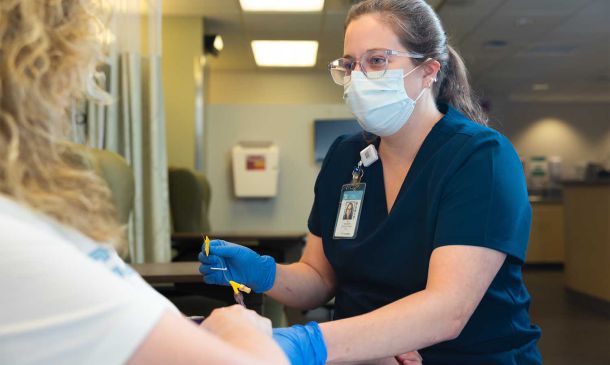Featured News

Innovating the future of esophageal research
The esophagus is an organ with a simple purpose—moving food from our mouths to our stomachs. But when something is wrong, treatment can be complicated, as it's hard to get medication to stick to the inside of the esophagus long enough to be effective.
Evan Dellon (UNC School of Medicine) and Anthony Blikslager (NC State University) are helping researchers test, discover, and study new drugs and treatments for esophageal diseases. Their PROMOTER project will develop models of these diseases in pigs, giving scientists an efficient and newly insightful way to investigate these conditions.

Modeling the lung in the lab
Only a few medications are currently approved to treat idiopathic pulmonary fibrosis (IPF) in the U.S., and these can sometimes cause significant side effects. Elizabeth Corteselli, a pediatric allergy and immunology researcher at the UNC School of Medicine, received help from NC TraCS to create a new lab model of the lung, giving researchers a way to observe how our lungs interact with everything we might breathe in, from pollution to dust to medications.

NC TraCS program alumni are researching the patient side of clinical trials
Marc Bjurlin, a urologic oncologist at UNC, is trying to solve the puzzle of how to get more people into the scientific research process. After participating in the TraCS Clinical Trialist Training Program (CTTP), and with support from his colleagues, Bjurlin has also published a series of papers looking at patient perspectives and experiences in clinical trials.

CTRC celebrates milestone as hub of clinical research studies at UNC
Tucked into the first floor of the Burnett-Womack building, just steps from UNC Hospitals, the Clinical and Translational Research Center (CTRC) is an unassuming spot for major advances to happen. Yet the 9,600-square-foot space acts as the physical heart of NC TraCS' efforts to bridge the gap between laboratory discoveries and patient care.

StoryMap explores how translational science improves medical research
Translational science works to make biomedical research—from basic research on genetics and cell biology to clinical trials and public health outreach—more efficient and more aligned with patient needs. In this new interactive StoryMap, we chart how NC TraCS supports scientists at every stage of this process, fueling impactful research and powering the future of next-generation medicine in North Carolina.

Advancing the research agenda at UNC-Chapel Hill
Announcements/News
Upcoming changes to NIH submissions
Partner with NC TraCS to maximize your funding success
Innovate Carolina releases new fiscal year 2025 impact report
Related News
UNC Research
Coordination, Communication, and Operations Support (CCOS)
NCATS
Subscribe to our email newsletter!
subscribe


